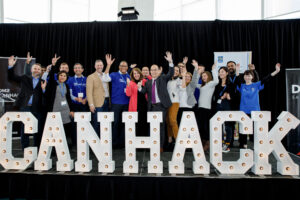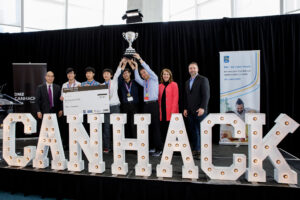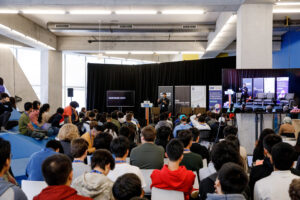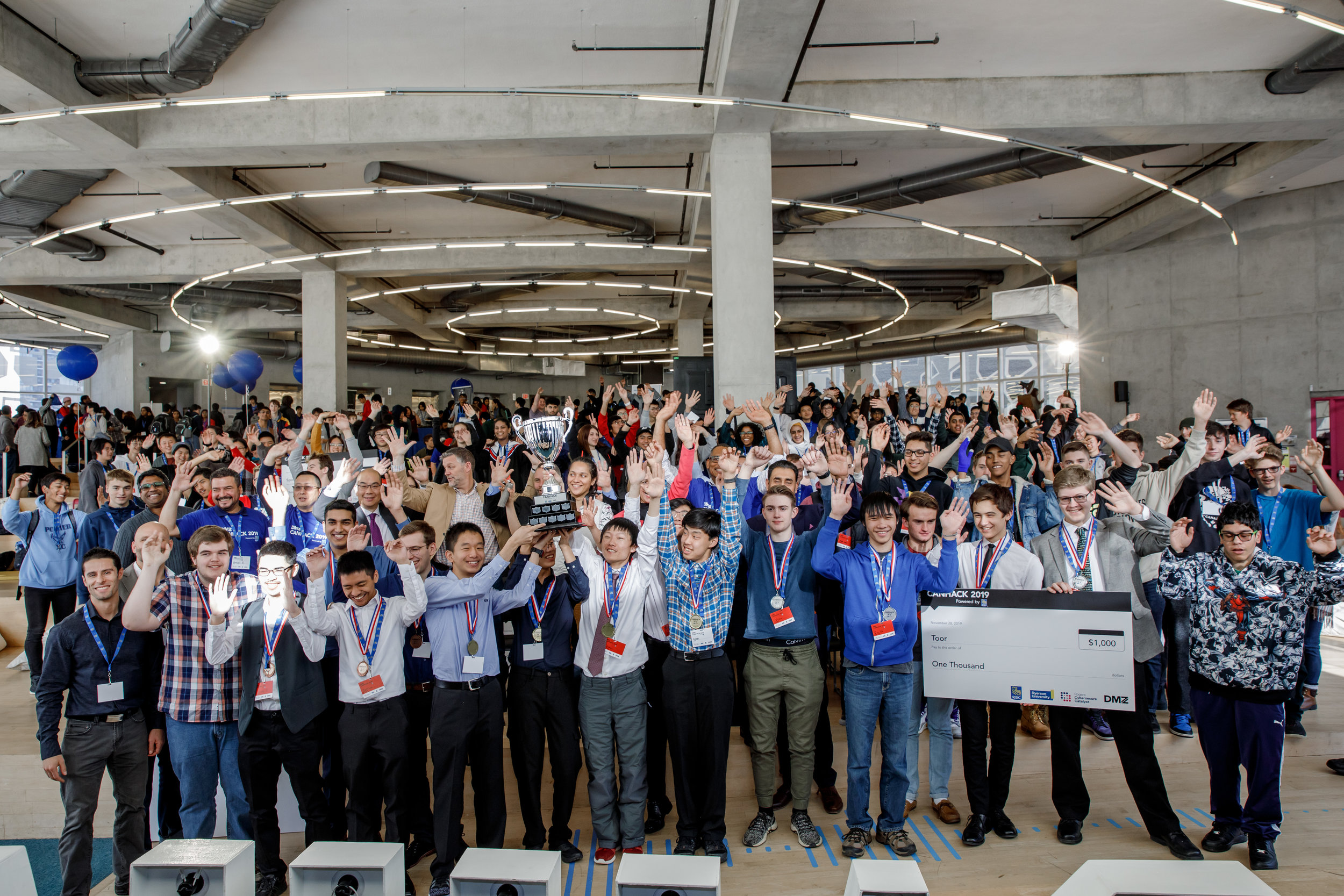COVID-19 and the talent shortage in cybersecurity skills
If changes in technology, growing risks of data overload, and increased usage of Cloud platforms have not already overwhelmed organizations’ IT and cybersecurity teams, they certainly will now.
COVID-19 has forced a large portion of Canadian employers, from government departments to private sector companies, to make a sudden switch to a remote working model (and for some, a permanent switch). The transition to operating in a remote format has brought about new implications for how organizations will maintain cyber safety since employees are now working in absence of companies’ usual security measures (firewalls, safe IT systems, etc.)
Furthermore, it has highlighted the greater need for more cybersecurity skills in the workforce. Talent shortages have long existed in the cybersecurity landscape, and we can only expect these skills gaps to widen even further as the new reality of remote working sets in.

Our solution: CanHack
At the DMZ, it’s our job to not only help startup founders accelerate their business growth but to also empower Canada’s next generation of innovators who aspire to make a real difference. We develop and execute initiatives like CanHack, our student cybersecurity competition organized in partnership with RBC, to promote cyber literacy and to also address digital skills gaps in the labour market.
DMZ is launching CanHack for a third year. Thanks to continued support from RBC, the program will continue to redefine how secondary education engages with cybersecurity skills and will introduce a brand new cohort of high school students to the challenge. As both partners leverage their strengths to break new ground together, the overarching goal will be to encourage more students to think about pursuing a future career in cybersecurity and computer science. This year, instead of the fall of 2020, the program will begin in Spring 2021 to give teachers more time to onboard their students. (continue reading for more details regarding the new 2021 program date).
How CanHack works
CanHack leverages PicoCTF technology, an online open-source computer security platform established by the Carnegie Mellon University Cylab Security & Privacy Institute. This game-based learning experience creates an interactive and engaging experience where students are tasked with addressing cybersecurity challenges faced by Canadian financial institutions.
The competition and program format allow young innovators to be immersed in a fun and stimulating environment where they gain critical computer security skills, work with experts in the cyber field and compete for cash prizes. Best of all? The program is completely virtual and no prior experience in cybersecurity is required to participate.
CanHack’s accomplishments to date
Since launching in 2018, CanHack has already:
- Helped over 4000 high school student participants gain valuable knowledge and experience in cybersecurity
- Worked with 91 schools in 2019, and 76 schools in 2018
- Distributed $6500 in competition cash prizes to students and $9500 to schools to help integrate more technology into student lives

What’s to come? CanHack 2021
As partners, DMZ and RBC have forged a number of firsts in the Toronto tech community over the course of this relationship. CanHack 2021 will be a natural next step for this partnership in empowering a stronger, more vibrant cybersecurity landscape within Canada.
“Cybersecurity has become a major and critical element for all organizations with the acceleration of cybercrime, and the evolving threat landscape. Expansion of digital services driven by the challenges of COVID-19 and need for the mass enablement of a secure remote workforce, cyber skills have become a key resource to nurture and invest in,” said Matthew Tim, VP Cyber Technology Office at RBC. “By partnering with DMZ and sponsoring initiatives like CanHack, RBC is investing in the future of cybersecurity by encouraging greater participation and interest from the young adults in high schools across Canada. We would like to promote greater involvement and interest in cyber as a career to narrow the skills gap.”
In an effort to increase program accessibility Canada-wide (and plan around COVID-19), we’re taking CanHack virtual this year with all workshops and sessions available online for students and teachers to engage with. In coordination with proper health and safety guidelines, we anticipate running in-person and virtual info sessions and workshops in Fall 2020. The CanHack Challenge Launch Event for PicoCTF will then take place in March 2021.
Besides offering programming to students coast to coast, CanHack 2021 will also be special in that DMZ will run female-only workshops on a number of cybersecurity topics to support females in STEAM and work with organizations like Hackergal to inspire and recruit more female participants to the challenge.
Hear from CanHack participants
A student’s perspective
“CanHack 2019 was very enjoyable for me. I got to learn more about cybersecurity and the different specializations within it, and technology in general. The competition gave me a good chance to compete with my friends and it was actually fun to play the game, see the campus of Ryerson as well as the downtown area. During the cyber expo day, I learned a lot about other people’s experiences and why each company was partnered with the event. I learned that as companies move into a more digital world, they need a good cybersecurity foundation, especially since there is more and more criminal activity around the cybersecurity field. I also listened to a 16-year-old entrepreneur and how she is using technology to change the world. Overall, CanHack was a great program to play in and I hope they can continue to do what they do in the future!”
– High school student from Middlefield Collegiate Institute
An educator’s perspective
“For the last two years, Clarkson Secondary School has taken advantage of the amazing opportunity provided by the Ryerson DMZ and RBC to learn about computer securities. This program has become a mandatory component of the computer science courses for students in grades 10 and 11. Prior to taking part in this event, students in my classes would have had very minimal exposure to cybersecurity or even a linux shell; now students get a full two weeks where they are exposed to this content. There is no way that I would have been able to create anything close to the PicoCTF competition on my own, and it is only through the partnership with the Ryerson DMZ and RBC that Clarkson Secondary School students get this experience.
CanHack allows students to develop a set of skills that goes behind technical know-how: teamwork, collaboration and leadership skills. Additionally, students have become significantly more aware of the impact that cybersecurity has on their daily lives. While the obvious benefit is to students who will study computer science and computer engineering once they leave high school, even students who will major in social sciences are now looking at laws and ethics around computer technology and cybersecurity. I want to personally thank the Ryerson DMZ, RBC, and their sponsors for allowing the students at Clarkson Secondary School to take part in this event over the last two years. Students now come into my classes asking when the competition will start every September.”
– Matthew Arduini, Curriculum Head – Mathematics, Computer Science, and Business, Clarkson Secondary School

With RBC’s diverse support and DMZ’s relevant programming, combined with the growing demand to bolster digital literacy in cybersecurity among Canadian youth, CanHack 2021 will be positioned to be a top challenge in Canada.
For high school educators across Canada who are interested in bringing more cybersecurity education and opportunities for students into their schools, you can learn more about the format of the program by reaching out to us at dmz@torontomu.ca.
For high school students looking to gain knowledge and experience in the areas of cybersecurity and computer science, stay tuned for more information on CanHack 2021!

